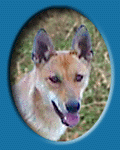Banbury Cross Farm
Carolina Dogs / American Dingos

"You're one of the very few who have actually preserved the breed and cared about them remaining true. We need more of that, and need to support those who do it right." -Raluca


During the last 30 years, the capture and study of free-ranging dogs in remote areas of South Carolina and Georgia has revealed the existence of dogs of primitive appearance fitting the typical long-term pariah (i.e, primitive/dingo) morphotype. Their physical appearance suggests a dog created by and preserved through natural selection to survive in the remote lowland swamp and forest land regions of the southeastern United States, They closely resemble types of dogs first encountered by Europeans near Indian settlements in the region as is evidenced by paintings, drawings and written descriptions made by these early explorers and settlers.
These dogs have been brought into a captive breeding program. Several behavioral traits have been discovered that appear unique to these dogs, and many behaviors labeled as primitive are consistently manifested, Such behaviors include pack hierarchy, communal pup rearing, regurgitation for pups, and organized, cooperative hunting.
Preliminary mitochondrial DNA testing performed by the University of South Carolina's College of Science and Mathematics shows a possible strong genetic link between Carolina Dogs and other primitive breeds like the Australian Dingo.
The Carolina Dog Association has been inundated with correspondence from people who think their dog may be a Carolina Dog. Many of these dogs were adopted from animal shelters or picked up as strays, and their origins are unknown. Send pictures and description to Jane Gunnell at janefoxandhound@gmail.com, or mail to Jane Gunnell, 262 Eastgate Drive, #342, Aiken, SC 29803.
• The dog must fit the general description as set forth by the ARBA standard for the breed. Dogs with blue-spotted tongues, tails curled over the back (spitz-fashion), or that are considerably smaller or larger than 35 to 55 lbs., will not be considered, nor will dogs with coat colors or markings not recognized by the Breed Standard.
• Any dog showing any signs of aggression toward humans will be immediately disqualified from consideration.
• The dog should exhibit primitive behavior traits, including, but not limited to: pack hierarchy (pecking order mentality) with other dogs, strong prey drive, the digging of snout pits from September through February, regurgitation for pups, communal pup rearing, digging of elaborate nesting dens, feces covering, etc. At least one or more of these behavior traits should be present.
Yes, these dogs are terrific with children. They are very social by nature, and enjoy the attention they receive from children. They bond quickly with their human "pack" and love to be included in all family activities.
As with any breed, Carolina Dogs should be introduced to strange children in a controlled, monitored setting to ensure a pleasurable experience for all parties involved. Carolina Dogs are rugged and can withstand the playfulness of young children, but children should be taught to handle all dogs with a kind and gentle hand.
Yes, they do. There are Carolina Dogs living in the homes of families all across North America. They tend to be easily housebroken (with proper training), easily crate trained, and are not destructive in the home, as long as they are kept mentally stimulated with toys, training, and lots of attention.
Carolina Dogs tend to get along well with other pets. They have been brought into homes with established pets and seem to adjust quickly. Carolina Dog pups tend to see older dogs as "alpha" (superior) dogs and will act submissive and defer to them.
They are good with cats if introduced when they are young. Getting along with other pets (snakes, hamsters, guinea pigs, rabbits, etc.) depends on the individual dog and the care given in training the pup to accept these pets as part of the "family pack."
Carolina Dogs are currently being maintained in several types of enclosures, such as fenced-in back yards, etc. They are not likely to try to dig out or jump over as long as they are happy and stimulated inside their enclosure. They are not as inclined as many other primitive type dogs to escape or "be free", but do have a strong hunting instinct, and should not be allowed to roam free in an unfenced yard.
Carolina Dogs are by nature active in their habits. They are not, however, high strung or nervous dogs. Daily walks, play in the yard, toys and maybe the occasional camping or hiking trip will do fine to keep your Carolina Dog in top form. These dogs do well in obedience and agility training, frisbee competitions and any other physical activity you, as the owner, may enjoy.
Thus far in our captive breeding program, we have not encountered any inherited defects in our dogs. We now have 5th and 6th generation captive-bred pups that are strong, healthy, and of perfect temperament. We hope to incorporate breeding programs that will ensure genetic variability within a small population of dogs and produce the best dogs available.
These dogs are naturally healthy. Hip dysplasia, eye, ear and skin problems prevalent in many other breeds are thankfully lacking in our breed at this point in time.
Carolina dogs are available from Banbury Cross Farm. Contact the office at 803.649.0045, contact Jane Gunnell, JD at 803.215.6164 / janefoxandhound@gmail.com, or William Morgan "Billy" Benton at 803.215.6166. Banbury Cross Farm is located in Aiken, South Carolina our mailing address is Banbury Cross Farm, 262 Eastgate Dr, Ste 342, Aiken, SC 29803.



